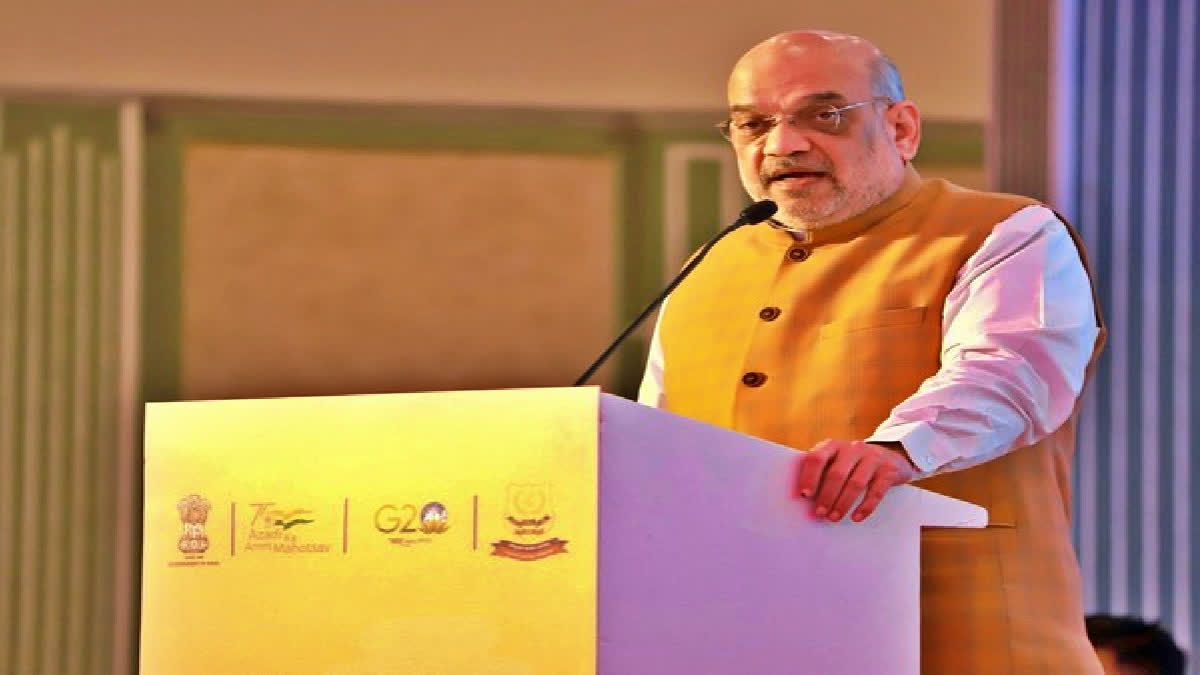Kibithoo (Arunachal Pradesh):Amid China questioning his visit to Arunachal Pradesh, Home Minister Amit Shah came up with a strong-worded reply on Monday and said that "no one can encroach land equal to needlepoint" and that "no one has the power to cast an evil eye on us".
The Home Minister said that no one can cast their "evil eye" on India in today's time as the Indo-Tibetan Border Police and Indian Army are guarding the borders. "The entire country can sleep peacefully in their homes today because our ITBP jawans and Army is working day & night on our borders. Today, we can proudly say that no one has the power to cast an evil eye on us," Shah said while addressing on the occasion.
Shah said that India is taking all measures to boost its security. "Today, we say with pride that gone are the days when anybody could encroach on India's land. Today, we can proudly say that no one can encroach even a tip of a pin's worth of our land because ITBP and Indian Army are present at our borders. I salute the sacrifices of all the jawans. Whosoever came to encroach the land here in 1962 had to return because of your patriotism," he added.
He said that the Modi government's Look East policy has accelerated progress in the Northeast and the region now contributes to the development of the country. "Before 2014, the entire Northeast region was known as a disturbed region but in the last 9 years, because of PM Modi's 'Look East' policy, Northeast is now considered an area which contributes to the development of the country," he said.
The Home Minister described Kibithu as India's first village and not last village. "Kibithoo is India's first village & not the last village. Earlier when people visited here, they used to say "I had gone to the last village of the country, but today, I'll say that I visited the first village of India," he said.
Earlier, Beijing had called Amit Shah's visit "not conducive to peace". "Zangnan is China's territory," spokesperson Wang Wenbin said in response to a question on the visit by Amit Shah. "The Indian official's visit to Zangnan violates China's territorial sovereignty, and is not conducive to the peace and tranquillity of the border situation."
It may be recalled that Beijing on April 2 "standardized" 11 places in Arunachal Pradesh and called them 'Zangnan' claiming them as part of its territory. However, India on April 4, rejected China’s sovereignty over the region outright. Shah’s visit just a week later to Kibithoo becomes politically significant.
Also read: Former IAF official urges Arunachal Govt to rename areas in China
Shah's visit to Kibithoo was part of the launch of the Vibrant Villages Programme, a government initiative that will sponsor development projects across Arunachal Pradesh, as well as in Sikkim, Uttarakhand, Himachal Pradesh, and the Union Territory of Ladakh. The program will focus on 2,967 villages in 46 blocks of 19 districts across these regions, with the aim of providing livelihoods and empowering the people living in border villages.
In addition to his visit to Kibithoo, Shah also paid homage at the Walong war memorial during his trip to the region. China's opposition to his visit is the latest in a series of skirmishes between the two nations over the disputed border. In recent years, clashes in mountainous regions have led to strained ties between China and India.
The ongoing dispute over the border between the two nations dates back several decades, with China claiming large swathes of territory in the Himalayas, including Arunachal Pradesh, which it refers to as South Tibet. India, meanwhile, claims that China's claims are unfounded and that the disputed region is an integral part of Indian territory.
The situation has been complicated by the fact that the border between the two nations is largely undefined, with both sides having different perceptions of where the border lies. This has led to frequent stand-offs and skirmishes, and the deployment of large numbers of troops on both sides of the border.
The dispute has also been a source of tension between China and other nations in the region, with several countries expressing concern over China's increasing assertiveness in the South China Sea and the Indian Ocean. The United States, in particular, has been vocal in its support for India and has been working to strengthen ties between the two nations in recent years.
India has maintained that Arunachal Pradesh is an integral part of the country and that China's naming attempts will not change the ground reality. The official spokesperson for India's Ministry of External Affairs, Arindam Bagchi, stated that China has made similar attempts in the past, and India has criticized these attempts. Bagchi reiterated that Arunachal Pradesh is a part of India, and China's naming efforts will not alter the situation.
The United States has also opposed China's move and strongly criticized any unilateral attempts to advance a territorial claim by renaming localities. White House Press Secretary Karine Jean-Pierre had said, "This is another attempt by the Chinese claim on US, Indian territory. So the United States, as you know, has recognized that territory for a long time and we strongly oppose any unilateral attempts to advance a territory claim by renaming localities. And so, again, this is something that we have long stood by a few things”.
Also read: 'Nothing will change for us if they don't': India on US support over Arunachal row
